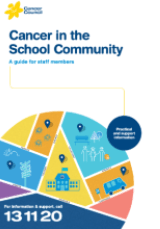- Home
- About Cancer
- Schools and teachers
- Cancer in the school community
- Talking about cancer in schools
- Appointing a school liaison person
Appointing a school liaison person
If a student has cancer, one of the most helpful things you can do is to appoint a particular staff member as the key point of contact in the school. It may be the student’s main teacher but could also be another teacher or a member of the learning and support or wellbeing teams.
To help avoid further stress, it is important that the student and their family feel comfortable with and have a good rapport with this person, and that the arrangement is reviewed regularly.
The school liaison person can keep up to date with the family’s changing needs and communicate with other staff on their behalf. They can also liaise with the hospital school and other education professionals. This reduces the chance of messages being misunderstood or the family having to repeat information.
→ READ MORE: Understanding differences
Podcast: Explaining Cancer to Kids
Listen to more episodes from our podcast for people affected by cancer
More resources
Claire Tobin, Principal Medical Advisor, Department of Education and Training, VIC; Dr Antoinette Anazodo, Paediatric and Adolescent Oncologist, Sydney Children’s Hospital and Prince of Wales Hospital, Director of The Sydney Youth Cancer Service, and Conjoint Senior Researcher, University of New South Wales, NSW; Lisa Barrow, Clinical Nurse Educator, Children’s Cancer Centre, Royal Children’s Hospital, Melbourne, VIC; Margo Bulic, Psychosocial Support Worker, CanTeen, ACT; Amber Copeland, 13 11 20 Consultant, Cancer Council Queensland; Donna Drew, Clinical Nurse Consultant, Paediatric Oncology/Palliative Care, Kids Cancer Centre, Sydney Children’s Hospital, Randwick, NSW; Allesha Fecondo, Education Consultant, Victorian Paediatric Rehabilitation Service, and Education Liaison, Ronald McDonald Learning Program, Ronald McDonald House Charities Australia, VIC; John Friedsam, General Manager of Divisions, CanTeen Australia, NSW; Pina Hutcheson, President, Catholic Primary Principals’ Association of WA; Cara Irvine, Year 8 Coordinator, Alfred Deakin High School, ACT; Andrew Long, Assistant Director, Policy and Research, Independent Schools Council of Australia, ACT; Dr Alistair Lum, Post-doctoral Research Fellow – Behavioural Sciences Unit, Sydney Children’s Hospital, University of New South Wales, NSW; Kristine Luszczynski, Learning Program Manager, Quality and Standards, Ronald McDonald House Charities Australia, NSW; Anita Neville, National Manager, Ronald McDonald Learning Program, Ronald McDonald House Charities Australia, VIC; NSW Department of Education, NSW; Mandy Roney, Consumer; Shannon Rush, Primary School Program Manager, Camp Quality, SA; Luke Wade, Education and Career Support Consultant, Redkite, QLD.
View the Cancer Council NSW editorial policy.
View all publications or call 13 11 20 for free printed copies.

